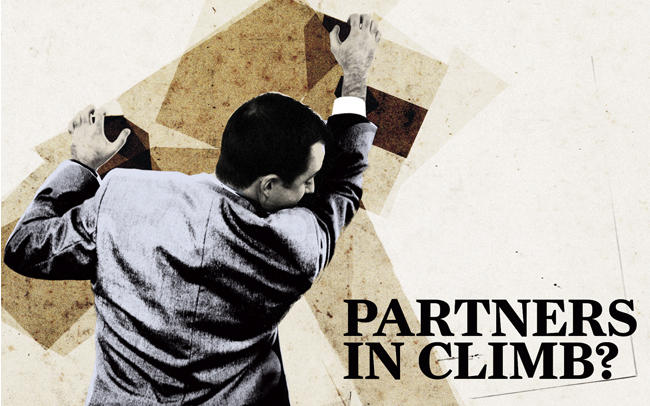Dust in your mouth, freezing air, the skin on your face like cracked leather, fingers at their breakpoint… you’ve climbed all day, with 600 meters to go...then you hear thunder and tumbling rocks above you.
"It is not the strongest of the species that survive, nor the most intelligent, but the one most responsive to change." Charles Darwin
The same quote is true of partnerships, business alliances or mountaineering teams on the ascent in foul weather, or back at base camp drinking cocoa.
Partnership, however, is an oft-abused term, given freely to another party when a transaction, or a series of one-off transactions has occurred.
The title “partner” is also given as a consolation booby prize in the absence of measurable value to the other party, as a way to get imbalanced conditions tied-up.
If you are not sharing various forms of value consistently, sharing in the costs of problem solving, you are not a real partner, but “free-climbing” on your own, next to the other party on the mountain, most likely carrying some of their gear to boot.
So, how do you know you are in a climbing partnership or free-climbing by yourself?
You audit and re-visit relationships to know if they are real partnerships, and if yes, test if they are ready for changing times.
That is, if you are not too lazy (err, too afraid) to ask.
To audit properly, you need to do much more than just a gear check by looking at excel sheets or “strategy documents” that are more like pike-dreams.
You must take a cool, cold look at who’s on the mountain with you, what total value is brought by working with them, how changing conditions will hit you in the cliff-face, and importantly, who’s pulling more of whose weight.
Real partner-relationships MIRROR each other’s proactive efforts, to generate real, sustainable value that adapts and thrives in changing environments.
If you are doing too much and getting too little in return, always giving on your side alone, when weather worsens, you’ll be sheet outta luck, with no one to grab on to but yourself.
Below is an basic example of a 360 degree pre-stage audit to determine if you are the gear-mule in a one-sided partnership, free-climbing alone or dumping your sacks onto other climber’s backs.
Depending on the climbing grade and industry, your audit criteria will change to suit your model, but use 10 questions at 10 points each to get started.
Each “Yes” answered gets you 10 points.
You can use this sample as both a supplier or buyer of services:
1. Do you have completed, signed, contracts that outline the obligations of BOTH parties to each other, in addition to all T&Cs? (If late payment/contract violations ever occur, without compensation, deduct 30 points from your total when finished)
2. Are results of meetings implemented effectively and timely?(be honest)
3. Are invitations proactively exchanged (regardless of topic)?
4. Are requests from one side, always exchanged for gives on the other?
5. Are these transactions critical to their future plans?
6. Is information proactively shared?
7. Are problems solved together, sharing the costs?
8. Are you proactively sharing business/new listings/new projects with the other party?
9. Do you share important time frames/deadlines/cycles with each other?
10. Is price just ONE of the topics you spend time discussing? (If you spend most time talking about price and discounts, then your answer is NO to that question)
Now add up your total, remembering to deduct 30 points if contract violations/late invoices are not compensated for elsewhere in your business relationship.
0 to 30 points - You are free-climbing and not in a real partnership, but hey, at least you know.
If you are pulling in revenue, don’t cut the line, but try to make them a climbing partner.
You have at best, a one-sided partnership and will be left to your own devices when the climbing & weather gets rough.
If they won’t share the weight, when you reach a way point, have a look around…
If you did this test with your supplier relations in mind, (conscious or not…) you are gear dumping, using your suppliers in ways that suite you and you alone. One day, you’ll be in a blinding storm and when you reach out, those familiar hands will not be there.
Look into various forms of value that both sides find important for their business, this can delivery schedules, extra listings, co-marketing, sharing office space etc. Not all exchanges are about simply paying for a service or product.
40 to 70 points - No-man’s land, slightly cloudy, with a chance for a lot more sunshine.
With fundamentals in place, you can improve the relationship to achieve more value for you both.
This will however, take time and the dropping of “ego-baggage” straight off a crevasse.
Sharing and exchanging is key for your mutual success no matter what the business or at what levels it is conducted.
And in order to share, you need to care, about what happens to the climbers in your troop.
Learn more about the priorities of your counterparts, but to do that, they need to trust you.
80 to 100 points - A climbing team ready for changing conditions and positioned for generating sustained value.
You have a mutually beneficial, value generating relationship, where you both share in the increased, measurable gains from your work, not just poster phrase talk.
But, there is always more value to be had in the relationship.
Brainstorm with your climbing partners to map out what that increased value can be.
Use a whiteboard and openly discuss issues, risks, benefits from each side's view, you'll be amazed at how much value is frozen up not benefiting anyone.
***
The only thing certain in business now is, we will have less warning when change happens.
Very little is rock solid anymore.
A real partnership climbing in unison, successes tied together, sharing the gear load, is the optimal way to traverse rough spots, adapt to changing conditions and reach even higher elevations.
Auditing, revisiting and growing real partnerships will pay for itself many times over, you just need guts to make it happen.
The other, most important half of mountaineering, is getting back down alive, will your partners be coming with you?
Other posts by Jason de Luca:








Comments
Anonymous (not verified)
April 12, 2010 - 12:55
Permalink
Good Article!
Some very good points. Unfortunately in most cases human nature kicks in and it becomes "everyone for themselves" time again. symbiotic partnerships are ideal but require a strong relationship of trust. And trusting when your survival is at stake is tough
Anonymous (not verified)
April 20, 2010 - 17:16
Permalink
Thanks for reading.
Absolutely agree.
Many times in my career I have been forced into the same situation just to keep the lights turned on.
The point of the article is not just that symbiotic relationships are ideal, but that making a simple checklist & audit of your partnerships can help you to truly understand if a balance is there.
With that knowledge, you'll find more appropriate ways to invest time and resources.
jd